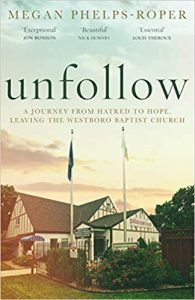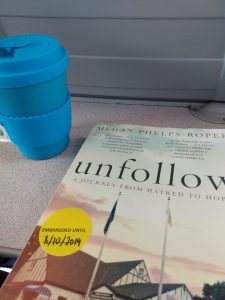I’ve already written about how Unfollow convinced me to start blogging again after a long hiatus. It’s funny how sometimes the right book hits you at the right time and sparks something in your mind. It made me Think Big Thinky Thoughts about Life, Hate, Family and Twitter. It might not press that button for for everyone but Unfollow is still a fascinating insight into what it’s like growing up in a loving family which was full of hate for the outside world.

For her whole life, Megan Phelps-Roper was a member of the Westboro Baptist Church – the fanatics who rejoiced after 9/11 claiming it was God’s way of punishing sinful America; the ones who picketed military funerals with signs saying Thank God for Dead Soldiers. Megan grew up with a God Hates Fags banner in her hand and later, on Twitter, became the church’s mouthpiece and online provocateur. But in 2012 she left, turning her back on the church’s message, despite knowing her family would cut her off.
When I first picked the book up I was afraid to trust Megan. Could you really grow up in a community of hate and simply let all those prejudices go? Had she really rejected all Westboro’s teachings or just chosen to leave the church after it turned on her family? There’s no doubt the latter was a factor, but as I read Megan’s slow unpicking of her belief system I was totally convinced by it.
You can raise your children to hate but it doesn’t necessarily stick
I learned quite a few surprising things from this book. Firstly that Twitter can be a kind place. We’re used to thinking of it as a shrill echo chamber or a troll’s paradise, and it’s people like Megan – or old Megan at least – who make us think that. For years she tweeted her church’s hate-filled message, dressing it up in clever banter and emojis (You’re going to hell 😀), raising hysteria and public awareness of her obscure little church in the process.
But while most people reacted with (understandable) outrage others, including Jews and members of the LGBT community, engaged patiently and kindly, gradually breaking down the rigid thinking imposed by her family until it finally fell away.
That’s the other thing I learned from the book – you can raise your children to hate, but it doesn’t necessarily stick. It’s human nature to think, to question. These days everyone seems so polarised it seems impossible that civilised debate and questioning could change someone’s mind – but in this case it did. That’s something that’s good to know.
For slow readers, the part at the beginning, where she’s still signed up to the church’s thinking might be an uncomfortable read, especially if you’re a member of one of the groups she was taught to revile or a victim of one of the church’s pickets. But I do think it’s worth reading on.

There are definitely still secrets at Westboro – Megan alludes to the violence of her grandfather and the temper of her mother but won’t go any further – her loyalty to her family is still tangible throughout the book even as she rejects their ‘values’. They might condemn her as a fallen woman on her path to hell but she will never let go of them.
I found the Bible verses hard going – long thee-and-thou quotes lovingly drawn from the King James Bible, which the Westboro members used to justify their hardline stance. I found myself grumpily skimming over lots of those but as I read on I came to understand why they were there. They’re not for me, or for 98 per cent of the people reading this book – they’re for her family. Because I get the feeling that the real reason Megan has written Unfollow is as an escape manual for her siblings who are still trapped in the Church’s thinking, and an explanation to her still-beloved and now estranged parents. That fact alone makes it a heartbreaking read.
Unfollow: A Journey from Hatred to Hope by Megan Phelps-Roper is out now
